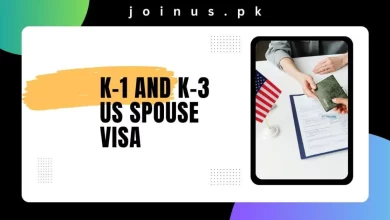Rejection of Job Application – Valid Reasons
Obtaining employment has become increasingly challenging due to the ever-changing nature of the labor market. Candidates are confronted with supplementary obstacles in their employment search as a result of the evolution of technology and modifications to recruitment strategies.
Over 90% of Rejections Happen due to Poor Resumes
The format of a resume or CV is a fatal but frequently disregarded factor in the denial of employment applications. Due to the intense competition in the job market, the manner in which you present your resume is critical to establishing a favorable initial perception. Applicant tracking systems (ATS) and recruiting managers may automatically reject resumes that are inadequately organised, fail to include industry-specific or job-specific content, or are submitted in incompatible formats.
Check Also: K-1 and K-3 US Spouse Visa – I-130 Petition
Ensure that your resume is in a format that is compatible with the job application system (usually PDF or Word) and that it is customised to emphasise the most pertinent skills and experiences for the position in order to avoid this pitfall. A Europass CV or well-structured, ATS-friendly resume that mirrors the language of the job description increases the likelihood of being noticed.
In summary, a resume that is customised and format-compatible showcases your meticulousness and dedication to the position, thereby substantially bolstering your opportunities during the job search.
The following list of the top twelve reasons for job application rejections this year, compiled from reliable research, offers suggestions on how to avoid common pitfalls.
Reasons for Rejection of Job Application
1# Generic Cover Letters
Long gone is the era of one-size-fits-all cover letters. Customizing your application to align with the company and position in question can effectively distinguish you from the competition and demonstrate your sincerity. Customizing your message signifies that you have conducted sufficient research and recognize genuine compatibility with the organization; therefore, I strongly advise job seekers to generate customized cover letters that correspond with their resumes.
2# Not Highlighting Transferable Skills
In a world where career changes are frequent, it is essential to demonstrate how your skills are applicable to the new position. Be certain to emphasize in your interview or resume, or even more so, how your background qualifies you for the position at hand, particularly if your prior experience does not directly correspond.
3# Ignoring Application Instructions
Particularization commences during the application procedure. Neglecting to adhere to straightforward directives, such as the submission of mandatory documentation or the observance of specific protocols, may result in an automatic denial. One can readily prevent this error by diligently reviewing and complying with the application prerequisites.
4# Employment Gaps
Although it is not unusual to take a vacation from work, extended periods of unemployment may give rise to concerns. Substitute pertinent engagements that demonstrate your dedication to industry continuity, such as continuing education, freelancing, or volunteering, for the aforementioned voids.
5# Rushing the Application
It can make a difference in the fast-paced digital world if you take the time to carefully complete your application. Hasty reactions or casual errors indicate a deficiency in taking the opportunity seriously. Ensure that your attention to detail and best effort are reflected in your job application.
6# Dishonesty
Although the temptation may be great to inflate your application, the best course of action is to be truthful. Verifications of the candidate’s background or references may readily reveal misrepresentations, which may result in an immediate disqualification.
7# Poor Body Language
In the interview process, nonverbal indicators are enormously influential. Adequate body language, absent eye contact, or a feeble salutation have the potential to subtly impact the interviewer’s evaluation. Demonstrating awareness of one’s body language inspires confidence and curiosity.
8# Weak Communication Skills
In every position, effective communication is vital. Engaging in excessive conversation, employing superfluous fillers, or becoming excessively acquainted may undermine one’s professionalism. Effective communication requires precision, regard, and clarity in order to create a favorable impression.
9# Vague or Evasive Answers
The accuracy and sincerity of your answers serve as indicators of your proficiency and dependability. Disregarding inquiries or offering imprecise responses may engender uncertainties regarding one’s competence and erode one’s credibility.
10# Unrealistic Expectations
If ambition manifests itself in unrealistic professional aspirations or job expectations, employers may become disinterested. Strive to harmonize your ambitions with those of the organization and the practicalities of the position in order to prevent appearing disconnected.
11# Premature Salary Discussions
It is possible to bring up compensation too early in the interview process to indicate that monetary gain takes precedence over the position or the organization. Await a job offer or the interviewer’s prompt to bring up the subject before proceeding.
12# Neglecting Follow-up Etiquette
Beyond being courteous, a post-interview thank-you note demonstrates your continued professionalism and interest. Aside from that, excessive follow-ups may appear insistent and potentially damage your prospects.
The job application procedure necessitates a synthesis of conventional professionalism and flexibility in response to emerging standards. Candidates can increase the likelihood of leaving a favorable impression and ultimately obtaining the position they seek by comprehending and confronting these prevalent causes of rejection. Keep in mind that every application serves as a chance to demonstrate not only your credentials but also your comprehension of contemporary hiring methodologies and your compatibility with the ever-changing labor market environment.
Frequently Asked Questions:
-
How do you write a rejection for a job application?
After reviewing the many applications we received for this vacancy, we regret to inform you that we cannot consider you as a candidate. Although you are highly qualified, another candidate’s profile was even better suited to what we are currently looking for. Nevertheless, we wish you success in your future career.
-
How do you politely reject a job application?
A thorough rejection email should touch on the following elements:
1: Say thank you. Always thank a candidate for their time and interest in your company.
Humanize it. Always use the applicant’s first name and the title of the position.
3: Where possible, give feedback.
4: Invitation to apply again. -
How do you write an unsuccessful job application letter?
Thank you for applying for the position of with. Unfortunately, on this occasion, your application was not as strong as that of other candidates. After careful consideration, <I regret to inform you that your application has been unsuccessful.



